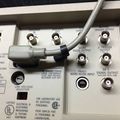2440: Difference between revisions
No edit summary |
No edit summary |
||
| Line 35: | Line 35: | ||
{{Spec | Sampling rate | 500 MSa/s each channel with simultaneous acquisition }} | {{Spec | Sampling rate | 500 MSa/s each channel with simultaneous acquisition }} | ||
{{Spec | Sampling type | Real time: 100 ns/Div and slower, Equivalent time 50 ns/Div and faster}} | {{Spec | Sampling type | Real time: 100 ns/Div and slower, Equivalent time 50 ns/Div and faster}} | ||
{{Spec | Single event | {{Spec | Single event bandwidth | 200 MHz}} | ||
{{Spec | Deflection | 2 mV/div to 5 V/div in 1-2-5 sequence }} | {{Spec | Deflection | 2 mV/div to 5 V/div in 1-2-5 sequence }} | ||
{{Spec | Auto scale factor | On-Screen Readout indicates probe tip deflection factors for ×1, ×10, ×100 and ×1000 probes }} | {{Spec | Auto scale factor | On-Screen Readout indicates probe tip deflection factors for ×1, ×10, ×100 and ×1000 probes }} | ||
Revision as of 05:33, 25 March 2024
The Tektronix 2440 is a two-channel 300 MHz, 500 MS/s digital sampling oscilloscope from the late 1980s.
It uses CCDs (essentially, analog shift registers) to store input samples at high speed and a single 8 bit flash A/D converter to digitize the time-multiplexed CCD output signals at 4 MS/s.
WARNING:
Operation of the 2440, 2432, 2432A, 2430, and 2430A: A/D-converter and CCD hybrids may suffer irreparable damage within a few minutes if operated out of the metal enclosure without extra cooling.
Key Specifications
| Channels | 2 |
|---|---|
| Resolution | 8 bit |
| Record length | 1024 samples |
| Bandwidth | 300 MHz (Limit: 20, 100, Full) |
| Sampling rate | 500 MSa/s each channel with simultaneous acquisition |
| Sampling type | Real time: 100 ns/Div and slower, Equivalent time 50 ns/Div and faster |
| Single event bandwidth | 200 MHz |
| Deflection | 2 mV/div to 5 V/div in 1-2-5 sequence |
| Auto scale factor | On-Screen Readout indicates probe tip deflection factors for ×1, ×10, ×100 and ×1000 probes |
| Input impedance | 1 MΩ // 15 pF or 50Ω |
| Sweep speeds | 2 ns/div to 5 s/div in 1-2-5 sequence (Modes A, A Intensified and B) |
| Auto measure | Simultaneously measures up to four parameters on one or more displayed waveforms, updated at 3 Hz intervals or display a snapshot of 20 parameters of waveform target |
| Acquisition modes | Normal, Envelope (glitch capture), Average |
| Display modes | CH1, CH2, invert, add, multiply, X-Y |
| Cursors | Volts, Time, Volts At Time, 1/Time, Slope |
| Functions | A Mode - Auto Level, Auto/Roll, Normal and Single Seq; B Mode - Trigger After Delay, Runs After Delay, 1K Record Length and more |
| Interface | GPIB |
| Probes | Two passive P6137 400 MHz ×10 voltage probes, 1.3 m |
| Power | 90 to 132 VAC or 80 to 250 VAC, 48 to 440 Hz; 160 W |
| Features |
|
| Options |
|
Links
Internals
The 2440 employs several processors − an MC68B09 main CPU controls the instrument, a custom 16-bit waveform processor performs signal computations, and an MC6805 microcontroller handles the front panel interface. The GPIB Interface is implemented with a TMS9914 controller.
The power supply consists of a buck-type pre-regulator followed by a push-pull inverter and linear post-regulators (except for the +5 V digital supply rail).
CRT is a 154-0850-01.








